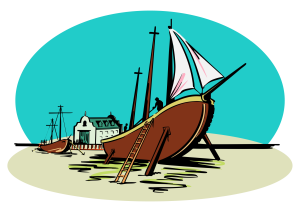Play Audio Story
Audio clip 1 available here on audio player.

Mike Trout’s great-grandfather established the original Trout’s Boatyard in 1902, over 120 years ago. As a young man, Mike found his feet working on cargo boats, stevedoring on Topsham Quay, and honing his craft in boat building. Alongside his wife Lynn, Mike has weathered the changes seen in the boatyard throughout recent decades, ensuring its endurance across generations. Here, the family reflects on how the boatyard continues to serve as a vital hub of craftsmanship, where boats are lovingly repaired, keeping the spirit of this century-old legacy afloat.
This trail marker is situated on a wooden fence by the boardwalk of the Exe Estuary cycle path, looking up-river towards Topsham.
What 3 Words: ///pinch.rejoiced.duties
Mike: My great-grandfather worked for Holman’s Dockyard, which is a big dockyard in Topsham. He got offered a job as Quay Master, Topsham Quay, and took that up in 1902. He then moved into the Quay House and proceeded to do, basically, odd jobs with the ships that were going because there were still a lot of coastal trading going on. He used to do the odd job which was too little, or too much fuss for the shipyard, basically. Because they were building ships, they didn’t want to mess about making a new spar, so he’d make a new spar, he’d repair this, he repaired that. He actually started off doing that from the Quay House. As Harbour Master because he wasn’t paid. (Lynn Trout: That’s here.) Which is where the Lighter is now, his workshop was the Lighter Bar. He wasn’t paid as a council employee, as such. He had a retainer, I think it was about a couple of quid a week, something like that. So he had to make money. So that’s what he did. And then my grandfather followed on, because he worked for him, and it sort of escalated from there.
In that period, the period when I started, we were basically working on local boats, so with local fishermen and the likes, there was no leisure craft as such. There were one or two, but they were very wealthy people and we looked after boats for them. The majority were commercial boats.
Lynn: Small ones. Salmon boats. Fishing.
Mike: Salmon boats and things. Quite often you did a job and the payment was a salmon or a feed of mussels, or something like that. Or they would come around and do something for you. It was a complete barter system. No one really worried about money because there wasn’t much money about anyway. Right after the war it was very dead. When the money wasn’t so good, I used to do stevedoring.
Lynn: Unloading the ships coming into the Quay.
Mike: Unloading the ships.
Lynn: In fact, I think your father relied on the fact that you could earn money from that as well as much as he could give him. If the ships were coming alongside, they had to be unloaded and the Trouts were responsible for finding the crew of men to do that.
Back to Trail Homepage Forward to Marker 2 – The Earl of Devon